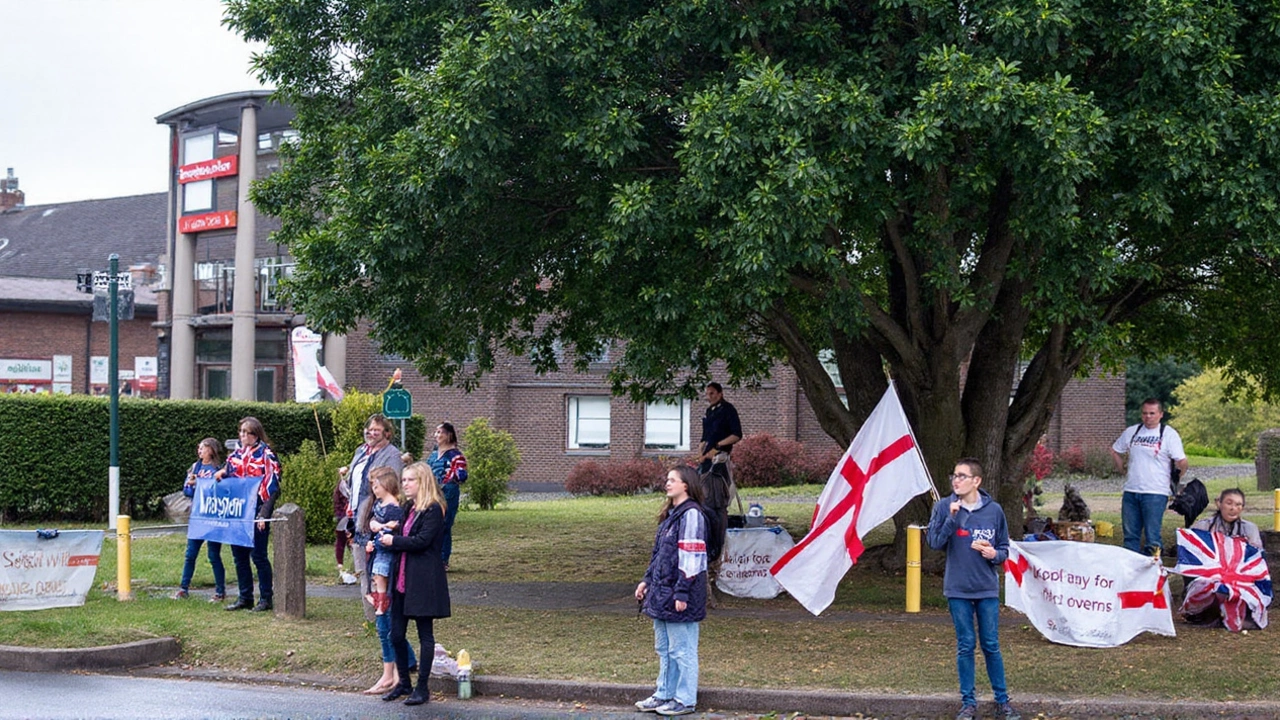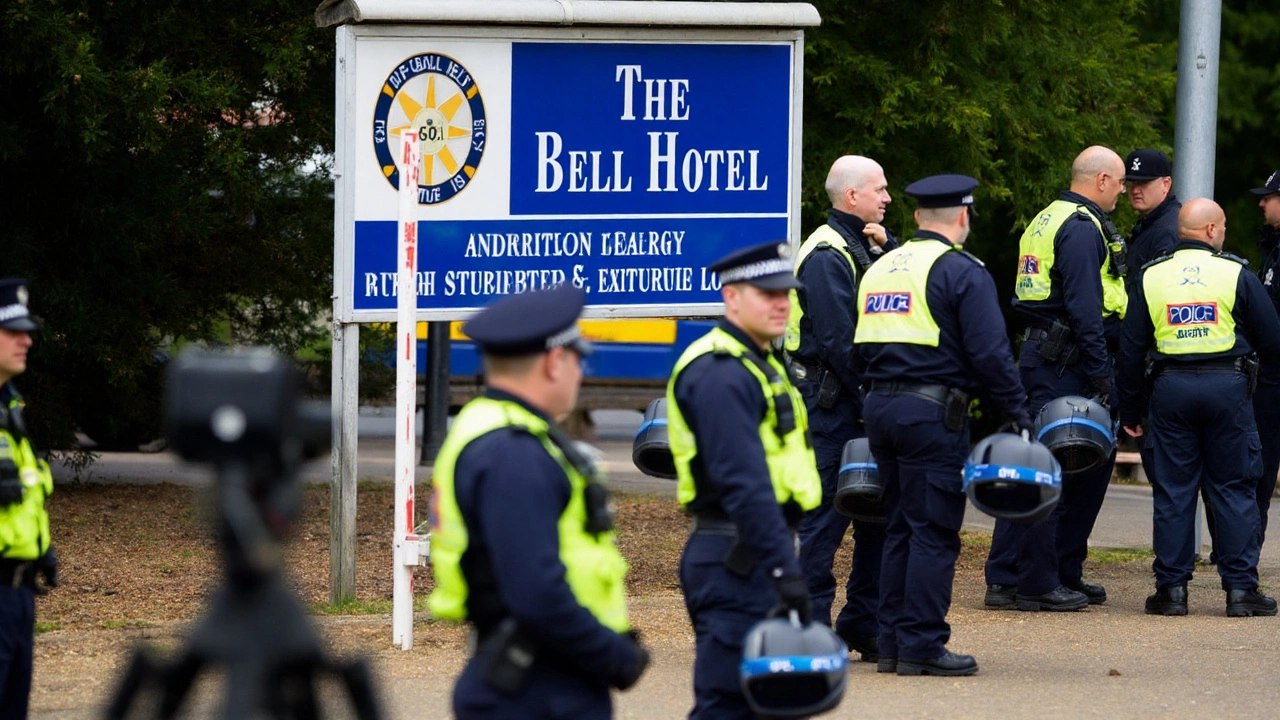A court decision lit the fuse
Shouts, banners, and police lines have returned to the edges of Britain’s hotel car parks. A week after the High Court sided with Epping Forest council in its bid to shut a hotel housing asylum seekers, protests spread across England and Wales, with dozens of rallies staged outside similar sites over the weekend of August 23–24, 2025.
The August 19 ruling ordered the relocation of people staying at The Bell Hotel in Epping by September 12, a clear legal win for the council after a month of noisy demonstrations outside the site. Activists who gathered there chanting “Send them home” treated the decision like a green light, and other councils quickly began exploring legal challenges of their own to force hotels in their areas to close to asylum use.
By Sunday night, protests had been logged at hotels and nearby town centres in Bristol, Leicester, Newcastle, Liverpool and a string of smaller towns. Police forces deployed extra units to keep rival groups apart. Officers said most gatherings were non-violent, but the tone was tense and openly hostile to migrants, with counter-protesters often outnumbered.
Horley, Surrey, became a focal point. Around 200 anti-migrant demonstrators rallied outside the Four Points by Sheraton where asylum seekers are lodged. Roughly 30 counter-protesters from Stand Up to Racism met at the nearby station. Between them: police vans, cordons, and a strategy of separation. The event drew extra attention because the Reform UK party—now leading national polls by 10 points over the governing Labour Party—amplified it on social media and in local WhatsApp groups.
In Epping, supporters of the legal action cheered behind barriers as drivers leaned on their horns in support. Some briefly blocked the road to dance and chant the name of far-right activist Tommy Robinson. Full-height fencing shielded hotel entrances, and uniformed officers took up positions along the perimeter to prevent confrontations with passersby and staff.
In Bristol’s Castle Park, mounted police were deployed to split opposing groups after shoving matches and shouting escalated. Officers later escorted small clusters of demonstrators away from the park to avoid further clashes.
The immediate backdrop is scale. Around 200 hotels are currently used to house approximately 32,000 people seeking asylum. The country recorded 111,084 asylum applications in the year to June 2025—the highest 12-month total since records began in 2001. The backlog of people waiting for initial decisions fell to 90,812 by the end of June, but it remains large enough to keep pressure on accommodation.
Ministers insist hotels are a short-term fix. Home Secretary Yvette Cooper has said the government will wind down hotel use “in a properly managed way” and set a target date of 2029 to end it altogether. The Home Office is seeking permission to appeal the Epping ruling, arguing the judgment could restrict its ability to place people quickly when no other option exists.
Rights groups and charities welcomed the drop in the backlog but worry the politics around hotels is hardening. The Human Rights Research Council supports the right to adequate accommodation and quicker decisions, calling on ministers to expand alternatives that don’t overload local services and don’t expose vulnerable people to harassment at their doorsteps.

Politics, planning law, and a system under strain
What exactly did the court decide in Epping? While the judgment’s full text will guide councils and the Home Office in the coming weeks, the core argument centered on whether long-term placement of asylum seekers changes how a hotel is used under planning rules. Councils say hotels are becoming de facto hostels or hostels-plus—uses that usually require planning permission and carry obligations to manage impact on local services and public order. The Home Office counters that it must be able to respond at pace to humanitarian need using the beds that exist, and that such placements are temporary.
Expect more cases. City halls from the South West to the North East are now reviewing whether to file similar challenges. If judges in different regions diverge, the issue could move quickly up the appeals ladder. In the meantime, some hotels may face immediate closure orders, while others will continue operating, producing a patchwork across the country and constant movement of people between sites.
Reform UK has moved to harness the moment, spotlighting rallies and urging supporters to keep up pressure on councils and MPs. The party’s polling surge—now a double-digit lead over Labour—reflects a wider frustration with immigration policy and public services under strain. Labour, in power nationally, is caught between competing demands: move people out of hotels swiftly, defend them from harassment, and avoid new flashpoints in the very towns where services are already stretched.
Police are keen to avoid a repeat of the violent racist riots of August 2024 that followed the Southport killings. Forces say they are learning from those events by separating groups earlier, deploying mounted units sooner, and moving agitators on before crowds ignite. So far, that approach has limited violence, but officers admit the rhetoric is coarser and more coordinated, especially online.
For local communities, the frustrations vary. Councils complain that they weren’t consulted before entire wings of hotels were block-booked, adding sudden pressure on housing, primary care, and policing. Residents say they’ve lost tourist beds and wedding venues at short notice. Small businesses worry about footfall. Hotel owners, caught in the middle, point to sky-high energy and labour costs and the certainty of government contracts versus the uncertainty of seasonal trade.
For asylum seekers, the issues are different: isolation on the edge of towns, uncertainty about when cases will be heard, long waits for GP registrations, and the risk of being moved with little notice—again. Charities warn that protests at hotel gates, even when non-violent, create an atmosphere of fear. Staff at several sites say they’ve had to adjust shifts and routes for security.
The economics are awkward. Hotels were always meant to be a stop-gap when local dispersal routes couldn’t cope. But sustained high arrivals and slower-than-expected decision-making turned a stop-gap into the backbone. Contracts worth millions of pounds a day keep beds open while the system tries to catch up. Ending hotel use needs a big boost in alternatives: faster decisions, more housing, and stronger incentives for landlords and councils to accept people.
Ministers say they’re expanding dispersal accommodation and exploring non-hotel sites. That includes larger, dedicated facilities that can support services on-site and reduce pressure on local GP surgeries and schools. But those projects are politically fraught and have sparked their own protests. Councils argue they need funding certainty if they’re going to take more people. Landlords want higher local housing allowance rates and guarantees against arrears before they’ll sign leases. Without those, the entire scheme leans back on hotels—exactly what both parties say they want to end.
The immediate timetable is tight. People in The Bell Hotel must be moved by September 12. The Home Office will try to consolidate placements where courts are less hostile, potentially moving people hundreds of miles. That, in turn, risks new protests as fresh towns become destinations overnight. Police chiefs are already warning of cumulative strain if weekend rallies continue into the autumn.
Community leaders are trying a different tack: de-escalation. Some councils are setting up briefings for residents on what support the government funds, how long stays tend to last, and where to report concerns. Faith groups are collecting toiletries and clothes but also lobbying MPs for faster asylum decisions so people can move on and integrate—or, if refused, be removed—without months in limbo. It’s not flashy work, but it reduces rumor and lowers the temperature.
To understand what’s driving the crowds, follow the numbers and the narratives. Applications are high by historic standards. The backlog is falling but still large. Hotel contracts remain widespread. Into that mix, activists post videos of coach drop-offs and claim cover-ups. Counter-campaigners share testimonies from hotel residents about threats and harassment. Both sides mobilize quickly, and the line between online and the pavement has never been thinner.
What happens next hinges on three things: the appeal of the Epping ruling, the pace of asylum decisions, and the availability of non-hotel accommodation. If courts restrict hotel use without new capacity coming online, the system will scramble—and the protests will likely keep spreading. If decisions speed up and placements diversify, crowds may shrink as the visible symbol of the crisis—hotel blocks—starts to disappear.
For now, the country sits in the gap between law and logistics. Councils test the planning code. The Home Office tests its emergency powers. Police test new crowd-control tactics. And thousands of people wait in rooms they never chose, under headlines they didn’t write, while Britain argues outside the lobby.
- Key dates: High Court ruling on August 19, 2025; relocation deadline for The Bell Hotel set for September 12.
- Scale: About 32,000 people in roughly 200 hotels nationwide.
- System pressure: 111,084 asylum applications in the year to June 2025; initial-decision backlog down to 90,812.
- Politics: Reform UK is polling 10 points ahead of Labour; ministers pledge to end hotel use by 2029, subject to legal outcomes and new capacity.
As the next weekend approaches, police expect fresh rallies and more counter-demos. Organizers on both sides are booking coaches. Councils are drafting legal papers. And in town after town, hotel car parks will again become the stage where Britain’s most combustible argument plays out: borders, belonging, and what fairness looks like in hard times. The country has seen violent flashpoints before; so far these anti-immigration protests have stayed just this side of that line. Whether they do so next week may depend on what happens in court—and what happens next at the front desk.
